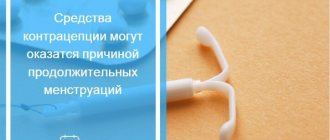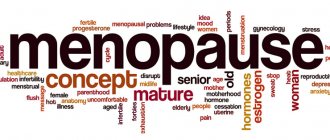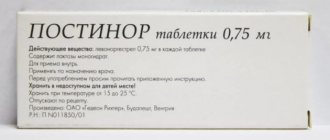Basic information about the drug
Jess is a combined modern monophasic preparation of hzlf oral contraceptives. Contains:
- drospirenone is a progestin component that provides antimineralocorticoid and antiandrogenic effects;
- ethinyl estradiol is an estrogenic component.
Protection against pregnancy is achieved by suppressing ovulation, changing the quality of mucus in the cervix (its thickening prevents the penetration of sperm), and the properties of the endometrium. In addition to protecting against unwanted pregnancy, Jess can have a therapeutic effect - its long-term and regular use reduces the manifestations of premenstrual syndrome. Namely:
- fluctuations in mood and emotional background;
- breast enlargement and tenderness;
- heaviness in the head.
Drospirenone reduces the appearance of acne (acne), oily skin and hair.
Expert opinion Daria Shirochina (obstetrician-gynecologist)
Indications for taking Jess are protection against pregnancy, as well as improving the quality of life by reducing the severity of PMS, as well as to obtain a pleasant appearance without acne.
Jess is a monophasic drug, which means that when taking the drug, a woman’s body receives the same dose of hormone-like substances every day. While during the natural process the concentration of hormones increases/decreases constantly. Therefore, the body needs time to adapt - from a month to three, during which disruptions in the menstrual cycle may occur, which do not affect the overall effect of the drug.
For information on indications and contraindications for taking COCs, rules of use, and additional effects of the contraceptive on the body, watch this video:
Recommendations for hormonal treatment
When undergoing a full course of treatment with hormonal drugs, the hormonal levels in a woman’s body are stabilized, and the onset of pregnancy is also prevented, which is extremely undesirable until the pathology is completely cured. It is strictly forbidden to self-medicate, trying to choose a drug on your own, without consulting a doctor. Due to the presence in each drug of a certain composition, the components of which are various types of hormones, some of them, instead of reducing the growth of fibroids, can, on the contrary, provoke an increase in the size of the myomatous node.
Before starting treatment, you must familiarize yourself with the full list of contraindications in order to avoid harm to your health.
It is recommended to conduct a thorough examination of the organs and systems of the body, paying special attention to the state of endocrine function, changes in which disrupt the secretion of hormones, which causes the development of hormone-dependent diseases (such as uterine fibroids, mastopathy, etc.)
By turning to a competent specialist, as a rule, you can achieve excellent results, which will become the key to health and will allow the woman to subsequently become pregnant and become a happy mother of a healthy child.
How jess changes menstruation
Jess is able to make your first periods different from what was observed before you started taking it. Without external influence, menstruation occurs with an increase in FSH and LH, which stimulate the work of the ovaries and the development of the germ cell, as well as estrogens and progesterone, which ensure the growth of the mucous surface inside the uterus. This is what changes in the process look like, which are caused by the use of a contraceptive:
- Jess makes scanty periods possible for the vast majority of women. Its active substance inhibits the functioning of the ovaries throughout the entire cycle, which interferes with the production of hormones. The endometrium in the middle of the menstrual period also does not thicken or become porous, as happens when not taking birth control pills. That is, when the moment of tissue rejection of the uterine mucosa comes, there are noticeably fewer of them than always;
- Another feature that jess gives to critical days is brown periods. The drug has the ability to increase blood viscosity. As a result, it coagulates and oxidizes faster while inside the uterus or vagina. Brown discharge is more often observed after a night's sleep and a long stay in a lying position, when it has less opportunity to come out;
- A circumstance that may alarm a woman taking Jess is discharge after menstruation. This does not indicate anything dangerous when observed in the first 2-3 cycles from the start of using the drug. This is an adaptation reaction of the reproductive system that does not require stopping the use of jess. On the contrary, abrupt withdrawal of the drug can provoke the spotting to turn into full-fledged bleeding.
Jess and PMS
Already the first menstruation after jess is characterized by a decrease in the negative manifestations of PMS:
- The skin becomes less oily. The hormones in the drug have the ability to suppress androgens in a woman’s body, which lead to greasiness of the epidermis and the appearance of acne. Girls in adolescence are prescribed this drug for this very purpose;
- Pain syndrome is reduced. The components of jess reduce the contractile function of the uterine walls. Due to this, pain in the abdomen and lower back also subside;
- Swelling is eliminated. Menstruation while taking Jess does not cause as many problems as before, thanks to the corticoid suppressing properties of the steroid drospirenone. It is the first ones that retain liquid.
The absolute effect of reducing severe manifestations of PMS may not occur from the very first period of using jess. In a month or 2-3, the body will adapt to its new mode of operation. The more actively the ovaries functioned, the longer the addiction will last.
It is important that there are no unbearable sensations that have not appeared before.
Timing of menstruation
The length of the cycle is different for all women, but the drug brings it to a general indicator. To understand when your period begins when taking Jess, you need to know that the standard package is designed for daily use of the pill for 28 days. The first 24 pieces contain the same amount of hormones. The last 4 have a reduced volume of substances, they are drunk at the end. This is a withdrawal syndrome that provokes the use of jess when menstruation begins, depending on the smallest amount of hormones in the blood. The usual period is 3-4 days of taking inactive tablets.
Some women taking Jess do not have their periods at all. This is considered as the norm, especially if menstruation was not heavy before. The drug has a depressing effect on the functioning of the ovaries, which can cause a complete absence of discharge on the expected days. There are other explanations for the absence of menstruation at a certain time:
- When a woman constantly keeps in her head “I drink jess - no periods,” perhaps it is not a hormonal factor that is to blame, but stress. Excitement and fear, no worse than any illness or medication, can delay critical days;
- Another reason why menstruation has stopped with jess is alcohol. It reduces the concentration of hormones if drunk in significant quantities, and the girl is thin. Even in the absence of conception, at the end of the cycle there may not be a sharp decrease in the level of substances, which means that menstruation is a prerequisite.
If Jess has lost her period for 1 cycle, you can safely start taking the next package of birth control. Their absence even after using the second blister requires a trip to the doctor to clarify the situation.
Pregnancy while taking the pill
While taking Jess, you may not have your period due to pregnancy. This cannot be ruled out, although it happens very rarely. There are factors that affect the effectiveness of a contraceptive.
- Confused pills.
- Drank with a delay in time. Or completely missed.
- Disease of the digestive system. Vomiting and diarrhea impair the absorption of hormones.
- Taking medications. Antibiotics and anticonvulsants reduce the effectiveness of contraceptives.
If all of the above factors are excluded, the absence of menstruation while taking the pills may indicate the presence of pregnancy. At the same time, the improved formula of the product allows you to maintain pregnancy if desired. The tablets do not have a negative impact on the development of the unborn child.
Jess is a new drug in gynecology, which should be taken only after consulting a doctor. You will have to constantly monitor your health and adjust your lifestyle.
With the standard “24 4” dosing regimen, your period should begin by the beginning of the next package. But there is another option. A woman can take the drug according to a flexible schedule. When using it, you can achieve a long delay in menstruation with the help of Jess.
If it is necessary for there to be a one-week delay, then the drug should be taken for 31 days. After this, you can take a break for 24 days. During this period, your period will begin.
A break can be taken between 25 and 120 days. At this time, there should be no bleeding; if they appear, then you need to take a four-day break. This scheme allows you to reduce the number of days when you have your period to a minimum.
Jess and periods
When taking Jess contraceptives, a girl’s course and quality of menstruation changes, so many are concerned about the question of how this drug should affect the menstrual cycle, and what changes can be considered normal. The effect of the pills may differ in different girls - it depends on the state of hormonal levels, age and other parameters, so below are answers to questions with “classic” examples, that is, those that are observed in the majority.
When to expect your period after Jess
Menstruation lasts 4-5 days when taking Jess, because the course of this drug begins on the first day of the menstrual cycle. There are 28 tablets in a pack, so there will be no recurrent menstruation during the period of taking OCs. When the course ends, menstruation will occur 1-4 days after taking the last inactive tablet (white), of which there are 4 in total - they contain a reduced concentration of hormones, this signals the body about the end of the menstrual cycle.
After stopping Jess, your periods do not end within 7-9 days; they are more scanty and viscous, and their shade is darker than usual: burgundy or brown. This is due to several factors:
- the drug thickens cervical fluid;
- the drug slightly thickens the blood in the pelvic organs;
- under the influence of OCs, less estrogen is released, and it is this that provokes “normal” heavy periods.
Gynecologists are often asked the following question: “I take Jess. When will periods return to normal after it is discontinued? You should not be afraid of any change in the quality of your periods, because if a woman no longer takes Jess, they will normalize in 1-3 months.
Lack of menstruation when taking Jess
Menstruation should last for the first 4-5 days of taking Jess, but some women observe that they can end as early as 2-3 days of taking the pills. There are several reasons for such a change in the nature of menstruation: firstly, Jess can stop the discharge if it was scanty before taking OK; secondly, the drug is incompatible with alcohol and severe stress, so under their influence a woman’s menstruation may stop prematurely.
The complete absence of menstruation when taking Jess may be due to the fact that the woman initially had a low level of estrogen in the blood, and this drug reduced it even more, so endometrial rejection occurred.
If your period began earlier, before the girl took the last inactive white tablet, then you should not worry - this is a normal reaction of the body to stimulate menstruation.
Lack of periods after Jess
After finishing using Jess, a healthy woman should definitely start menstruation, because this is why the pack contains 4 “marker” pills for the body, which do not have a pronounced contraceptive effect; they signal the end of the menstrual cycle. There are several factors that provoke the absence of menstruation after a course of Jess:
- long-term use of the drug;
- adaptation and disruption of ovarian function;
- hormonal imbalance;
- onset of pregnancy.
With long-term use of oral contraceptives, and Jess is no exception, the woman will not have no menstruation, but it will become light, and the discharge will be brown in color, which is due to the effect of the drugs on the endocrine system. Because of this, after stopping the use of pills, the reproductive system will not be ready to work again in a normal, natural rhythm, and the consequence of this will be missing 1-3 menstruation. Gradually, the body will recover, and menstruation will normalize.
If the discharge does not end
Often on forums on the Internet you can find complaints from women: “... I drink Jess Plus and my period has been going on for 10 days, what should I do...”. This is another acceptable deviation when taking a contraceptive.
In a standard situation, monthly bleeding lasts from two to five days. After this time, bloody discharge often begins. They have nothing to do with menstruation, acting as a sign of the adaptive period.
Prolonged menstruation after several cycles of use is considered a violation and requires serious diagnosis. Replacing the oral contraceptive will help solve the problem. If the doctor finds abnormalities in the functioning of the genital organs, then the use of contraceptives is stopped and appropriate treatment is prescribed.
Doctors' answers
1. Taking oral contraceptives is possible from the first day of menstruation (in this case there is no need for additional protection); it is also possible to start taking them on the 2nd–5th day of the menstrual cycle, but in this case it is recommended to additionally use an additional method of contraception during the first 7 days of taking the pills from the first package.
There are 28 tablets in a package. If the options are for three menstrual cycles at once, in this case one package contains 84 tablets. Composition of the drug Jess:
- The first 24 tablets are active with hormonal components, taken during the first 24 days of the cycle;
- The last 4 tablets are pacifiers, do not contain an active component, and the drug Jess Plus contains a metabolite of folic acid.
The basic rules for taking the pills are as follows: start taking pills from the first day of the cycle, with the onset of any spotting, if pregnancy is excluded; take a tablet every day at exactly the same time for 28 days; as soon as the package is finished, the next one should be started without any interruption, regardless of whether there is bleeding or not; if the package contains 84 tablets, then they must be taken continuously.
Jess in a flex cartridge with a Click dispenser
For most women, their periods change their character while using the pills. The features are as follows (subject to strict adherence to the rules for taking pills):
- your period comes exactly on the day of the week when the first pill was taken;
- spotting begins on the 2-3rd day of taking inactive tablets;
- menstruation is spotty, sometimes panty liners are enough;
- Menstruation often becomes less painful.
During the first two or three cycles, a woman may notice periodic acyclic spotting. You should not worry, this is an adaptation of the body, which should normally take place with long-term use.
As a rule, in women who take Jess, menstrual-like discharge becomes regular even if previously they were at large or too short intervals, but only if the drug was correctly selected.
Normally, spotting or even moderate spotting is allowed outside of menstruation during the first three months. If this continues for a longer period of time, you should consult a doctor to decide on changing the drug or changing the dosage regimen.
The following violations are possible: menstruation arrived while still on active tablets (it is better to continue taking it; but if there are more than 6-8 tablets left in the package, and menstruation has already begun, and this repeats from month to month, you should consult a doctor); there are no periods, but all the pills have been taken (allowed for three cycles); periods are smeared for a long time - up to a week or even more; no changes (the woman does not respond to the drug, a replacement is necessary).
Read in this article
With the help of Jess and Jess Plus, you can delay your periods without taking a break from taking active pills. However, we strongly discourage the abuse of such methods.
Oral contraception and menstruation - read.
The difference between Jess and Jess plus
A rather relevant topic is the difference between the drug Jess and Jess Plus. The main difference between the medications is the presence of an additional component - calcium folate, which promotes the healthy development of the fetus. Jess Plus is used during pregnancy planning to normalize a woman’s hormonal state. Discontinuation of the drug makes it possible to become pregnant during ovulation of the next cycle.
The use of Jess may be accompanied by a delay, which is not always a cause for concern. If a woman encounters such a problem, she should definitely visit her doctor to determine the cause of this condition.
Briefly about the drug Jess
Jess is a contraceptive containing a low concentration of two hormones: drospirenone and ethinyl estradiol. The drug provides a complex effect; its active components have several targets at once.
The hormones in the drug inhibit the maturation and release of eggs from the follicles, so ovulation in a woman’s menstrual cycle is absent or greatly reduced. The components of the tablets help thicken the cervical mucus, making it much more difficult for sperm to enter the fallopian tubes to reach the egg.
Hormones suppress the thickening of the endometrium, and even if the egg is fertilized, it will not be able to implant in the uterus. Jess reduces the activity of the ovaries - they produce less estrogen, which is what gynecologists use in the treatment of endometriosis or hyperestrogenism.
This is necessary in order to slowly prepare the body for hormonal influences. There are 28 pieces in a pack - this is the standard length of the menstrual cycle. The contraceptive effect appears after menstruation and continues until the end of the course of the drug. The tablets in the package differ in the dosage of active substances, so you need to start strictly from the beginning, and the last 4 pieces are “premenstrual”, they contain a lower concentration of hormones - this will be a signal for the start of menstruation.
When taking Jess, menstruation occurs at the same time every month, so this drug is used not only for contraception, but also to normalize hormonal levels and the menstrual cycle.
There are no periods when taking Jess
Starting to take “Jess” assumes the absence of menstruation, this is considered normal. However, with any delay in menstruation, girls tend to panic. The first thing to do if there is a delay is to check for pregnancy using a test. If it is negative, you are healthy, but there are no periods, then most likely it is because you drink “Jess”.
The first month of taking the pills rebuilds the established functioning of the hormonal system. Whatever the length of your normal cycle, under the influence of “Jess” it will be adjusted to 28 days. A delay in menstruation longer than this time should be a reason for a visit to the gynecologist.
This means that the drug:
- inhibits the functioning of the ovaries, preventing the maturation of the egg;
- prevents the formation of the endometrium (inner epithelium of the uterus);
- changes the composition of cervical fluid;
- changes general hormonal levels.
Suppression of ovulation by hormones means that the egg does not mature. The body, accordingly, does not receive the command to prepare a place for it in the uterus. The epithelium does not change, whereas, in preparation for fertilization, the inner layer in the uterus increases up to 10 times. When the process is suppressed, the endometrium is present, but in much smaller quantities. There is nothing to reject - periods do not begin, or they are scanty.
The stress of taking the drug serves as an excuse for missing periods only after the first month of taking it. Subsequently, the cycle becomes stable, although there is much less discharge than before the start of contraception.
Violation of the dosage regimen
You must take birth control pills strictly according to the schedule, every day, preferably at the same time.
Interruptions in the supply of contraceptives reduce the effectiveness of protection. In this case, pregnancy may occur.
Disorders in the digestive system, such as vomiting and diarrhea, are considered a pass. If one of these troubles happened less than 4 hours after taking the pill, then this should be considered a miss, since the main part of the drug is excreted from the body. When you don't have your period while systematically taking Jess, you may have forgotten about the party.
Alcohol
Alcohol in large quantities reduces the contraceptive effect of contraceptives. The maximum safe dose of strong drinks when taking “Jess” is 50 ml, wine, champagne 200 ml, beer 400 ml.
If you had to drink more than the permitted amount, then you should use mechanical methods of contraception for a week (while taking Jess).
If your period comes early
Most often, women confuse intermenstrual bleeding with menstruation. They are not dangerous in the first 2-3 months of therapy and can last 2 weeks. They disappear after the body adapts to changed hormonal levels and can smoothly transition into menstruation.
A large amount of discharge indicates breakthrough bleeding. It may occur due to the following factors:
- Individual intolerance to the drug.
- Too low dose of hormones.
- Gynecological pathologies of the ovaries, endometriosis, the presence of neoplasms.
- Smoking and alcohol abuse.
- Abrupt course cancellation.
- Skipping a pill.
- Taking antibiotics.
- Excessive use of antidepressants.
- Problematic absorption of drug components (vomiting, diarrhea during menstruation);
- Treatment with traditional medicine based on St. John's wort.
- Presence of sexually transmitted infections.
Women need to remember that menstruation during active pills during the first three cycles after the first pill does not pose any threat to health. There is no need to discontinue the drug, so you should continue to take the pills as usual.
Effect on menstruation
The critical days in the first months of taking Jess are slightly different from those before it. Nature dictates their onset under the influence of an increase in LH and FSH. They stimulate the ovaries and the formation of eggs.
Changes in the course of menstruation when using Jess include:
- Scanty discharge. This is due to the depressed state of the ovaries, which stop producing hormones in large quantities. Also, due to the constantly thinned and smooth endometrium, the amount of tissue that the body can reject is reduced.
- Brown color of discharge. Due to the peculiarity of the drug to cause blood thickening, they quickly oxidize even before leaving the vagina. Most often, this color is observed in the morning and after a long stay in a horizontal position. In such cases, the red secretion cannot come out and contracts in the uterus.
- Intermenstrual bleeding often occurs. Normally, they are observed in the first months after starting to take Jess. This is due to the reaction of the reproductive system, which is undergoing restructuring. You should not stop taking it abruptly, as this can result in severe bleeding.
Contraindications and side effects
It is important to study this point before using any hormonal drugs, because they contain microscopic doses of substances, but they will be enough to worsen your well-being and health. Contraindications to taking Jess are the following conditions:
Contraindications to taking Jess are the following conditions:
- pregnancy and lactation;
- renal and liver failure;
- migraine, psychiatric disorders;
- hormone-dependent tumors;
- inflammatory diseases of the genital organs;
- diseases of the cardiovascular system (heart attack, stroke, ischemia, heart failure, angina and tachycardia, hypertension);
- diabetes;
- blood clotting disorder.
If these contraindications are ignored, a woman may experience the following side effects of the drug:
- cutting or aching pain in the lower abdomen;
- digestive disorders;
- headaches, dizziness, decreased performance;
- drowsiness or, conversely, poor sleep;
- nausea;
- violation of the vaginal microflora, and as a result, thrush;
- aching pain in the mammary glands.
How else can you use the drug?
Jess is used for contraception and treatment. The drug can also change the menstrual cycle “at will.” For example, if you have an important trip or a vacation at sea. You can do the following:
- Delay your period for a few days. To do this, you need to remove and not take from the package the number of pacifiers for how many days you need for your period to come earlier in the next cycle.
- Delay menstruation for a month. To do this, you should not take dummy tablets at all, but immediately start taking active tablets from a new package.
If necessary, Jess can be used to stop bleeding in teenage girls and women. In this case, individual treatment regimens are prescribed by the doctor.
We recommend reading about the peculiarities of menstruation while taking birth control pills. From the article you will learn about the benefits and harms of taking OCs, the effect of contraception on the body, menstruation with various OCs.
And here is more information about how your periods go after Postinor.
Jess is a modern contraceptive drug that is also used for medicinal purposes to eliminate the symptoms of PMS and acne on the face. However, the effect of the drug is temporary - symptoms return immediately after taking it. For the convenience of using Jess, there are special dispensers that help you remember to take pills and retain basic information about starting to use the pills.
What reduces the effectiveness of the drug
Sometimes girls on the forums are interested in the question: “Why do I drink Jess and have spotting on the 15-16th day of my cycle?” This phenomenon could be due to the fact that certain facts reduced the effectiveness of the drug, and ovulation occurred - the release of an egg.
A decrease in contraceptive effect may be associated with the following features:
- vomiting, nausea or diarrhea after recently taking the pill (it has not had time to be fully absorbed);
- consumption of alcoholic beverages, cigarettes and drugs;
- taking antibiotics;
- use of anticonvulsants and vasodilators.
When using Jess, it is necessary to take into account the effect of these factors and avoid them so as not to reduce the effectiveness of the drug.
Jess tablets are one of the most effective and at the same time “convenient” contraceptives, since these tablets rarely give side effects and do not negatively affect the girl’s health. Above, answers were given to many questions related to the topics: “I accept Jess. How periods change, why they don’t exist, what to do if you miss a pill, etc.”
When using this drug, you must first study the instructions, especially pay attention to contraindications
httpss://www.youtube.com/watch?v=953rtbA7Tb8
Delayed menstruation not related to “Jess”
There are situations when a girl drinks Jess for more than one month, having a regular cycle. And suddenly my period doesn’t come. The first step, as always when there is a delay, is to take a pregnancy test. If your test shows a negative result, then this is the most unpleasant thing that can happen to a woman of reproductive age - the absence of menstruation for no apparent reason.
- Physical overload of the body;
- Nervous exhaustion;
- Diseases of the female genital area;
- Common colds or infectious diseases;
- Taking certain medications;
- Moving with a change of time zone;
- Weight changes;
- Climax.
Any of the listed reasons can serve as a trigger for a malfunction of the reproductive organs.
Physical and nervous exhaustion
When a girl is young, full of strength and desires, it is easy to cross the boundaries of the body’s self-healing. Working hard, chronic lack of sleep, intense sports or excessive entertainment lead to physical exhaustion. The body can compensate for the lack of rest by “winding down” some non-vital “programs”. For example, childbirth programs.
Diseases
Delayed menstruation due to illness is the most common cycle disorder. In case of a general illness, drink “Jess” according to the scheme, without interruption, in parallel with the prescribed therapy. Menstruation returns on its own as soon as the girl recovers.
Painful symptoms in the lower abdomen against the background of “missing” periods are a signal for an urgent visit to the gynecological clinic. It might start like this:
- polycystic disease;
- inflammation of the appendages or ovaries;
- myoma;
- oncological formations;
- pathological proliferation of the epithelium.
If these diseases are not treated in time, then everything can end in irreversible infertility.
Long, heavy menstruation brings no less problems to women. The monthly blood loss can become so significant that it causes anemia. If you have any problems (or suspected problems) in the female genital area, you should immediately contact a gynecologist.
Medicines
If your period does not start on time, the medications you are taking may be to blame. For example, for girls who go to the gym and take anabolic steroids, the absence of menstruation or an extremely irregular cycle is a common problem.
The same thing happens with taking antidepressants against the background of chronic fatigue and nervous overload.
Some antibiotics prescribed for infectious diseases can hypothetically cause the effect of disrupting the monthly cycle. However, it is impossible to say for sure what exactly was the cause - the prescribed treatment or the disease itself.
Weight fluctuations
The normal functioning of the reproductive system directly depends on the state of adipose tissue in a woman’s body. For example, underweight girls are delayed in sexual and physical development. Their menstruation begins late, is scanty, and is extremely irregular.
A similar effect is observed with sudden weight loss even in adult women. In this case, the absence of menstruation is the body’s protective reaction to lack of nutrition.
A significant supply of fat does not add health to a woman either. Obesity leads to an excess of estrogen. This condition is fraught with the onset of heavy bleeding outside the monthly cycle.
Moving
Simply moving, for example on vacation, to a distance with a change in time zones, leads to a disruption in the monthly cycle. Menstruation may be delayed by two weeks.
Climax
The entry into menopause is accompanied by the fading of menstruation. This can manifest itself differently in each woman, and each manifestation will be the norm if the lady is of advanced age. In young women (under 40 years of age), the onset of menopause is usually a pathology and requires drug correction.
Higher medical education, specialty obstetrics and gynecology, studied at Kazan State Medical University. Postgraduate student of the Department of Obstetrics and Gynecology No. 1. Co-author of scientific publications.
Good night! I started drinking Jess and in the second half of the cycle I started to have brown discharge, I drank pacifiers and haven’t drunk anything for 3 days, but I still haven’t had my period and the discharge has gone away for a couple of days now. Is it a hormonal imbalance?
Problems with the cycle
Problems with menstruation and discharge arise for various reasons while taking Jess. The drug can provoke copious secretions during menstrual periods if a woman suffers from diseases of the reproductive system. This often happens with endometriosis. It is worth remembering that in the first months of use, periods may be heavy. But later such a situation is unacceptable.
In other circumstances, you need to contact a gynecologist to find out the reasons.
If your period started earlier with Jess, don't panic. They are usually considered breakthrough bleeding, which occurs because the drug is inappropriate or the hormone concentration is insufficient. Also, this phenomenon is normally observed in the first cycles of using Jess. After taking a contraceptive for a long time, if menstruation occurs ahead of time, it is necessary to do an ultrasound. This is because such a phenomenon may indicate ovarian cysts.










